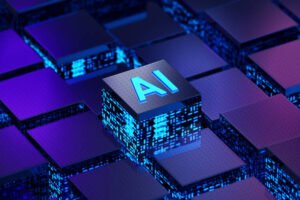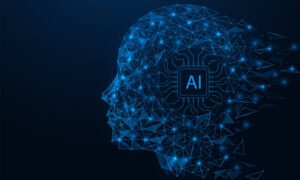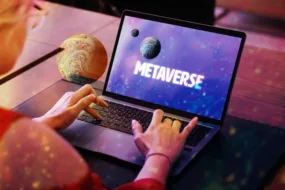Generative AI:

Imagine a world where machines can help you write captivating marketing copy, design innovative products, or even conduct scientific research at record speed. Generative AI (GAI) might sound like something out of a science fiction novel, but it’s rapidly becoming a reality with the potential to revolutionise the global economy.
This technology, capable of generating entirely new creative text formats, images, code, and even music, is poised to unlock a wave of innovation and economic growth unlike anything we’ve seen before.
What is generative AI?
In simpler terms, generative AI refers to a type of artificial intelligence (AI) that can create new content, ranging from text and images to music and even 3D models. Unlike traditional AI, which focuses on analysing existing data, generative AI learns from existing information and patterns to generate entirely new and original outputs.
The Economic Powerhouse: Generating Productivity with Generative AI

The most significant impact of generative AI (GAI) will likely be on productivity. By automating repetitive tasks and augmenting human capabilities, generative AI can free up valuable time and resources, allowing individuals and businesses to focus on higher-level activities. Here’s how:
1. Streamlining Workflows: GAI can automate tasks like data analysis, report generation, and even customer service interactions, freeing up human employees to focus on strategic planning, problem-solving, and innovation.
2. Boosting Creativity and Innovation: AI can help generate new ideas and concepts, assist with product design and development, and even write creative content like marketing copy or music. This can lead to faster innovation cycles and the creation of entirely new products and services.
3. Personalised Experiences: Generative AI can personalise user experiences at scale, allowing businesses to cater to individual needs and preferences. This can lead to increased customer satisfaction and loyalty, ultimately boosting revenue and growth.
Read More: Artificial Intelligence: Should It Be Regulated?
Quantifying the Impact of Generative AI: A Look at the Numbers
According to the World Economic Forum, “Our latest research estimates that generative AI could add the equivalent of $2.6 trillion to $4.4 trillion annually across the 63 use cases we analyzed—by comparison, the United Kingdom’s entire GDP in 2021 was $3.1 trillion. This would increase the impact of all artificial intelligence by 15 to 40%.”
Let’s delve into some specific sectors where generative AI is expected to have a significant impact:
1. Marketing & Sales: GAI can automate ad creation, personalise content marketing, and even develop targeted sales pitches, leading to increased efficiency and cost savings.
2. Manufacturing & Design: AI can optimise production processes, generate new product designs, and even predict maintenance needs, significantly reducing costs and improving product quality.
3. Healthcare: GAI can assist in drug discovery, analyse medical images for faster diagnoses, and even personalise treatment plans, leading to improved patient outcomes and potentially reducing healthcare costs.
4. Science: Scientists can focus on analysing and interpreting data rather than spending days collecting and organising it.
Future of Work: Generative AI and Adaptation to Change
While AI offers remarkable benefits, it’s important to acknowledge the potential shifts in the job market. Some repetitive tasks may become automated, necessitating skill development and adaptation from the workforce. However, the rise of generative AI is also expected to create new job opportunities in areas like data science, AI development, and human-machine collaboration.
Getting Involved in Generative AI: Prepare for the Future

Businesses can prepare for the generative AI revolution by:
1. Identifying areas for automation: Analyse existing workflows to identify tasks that can be automated with AI.
2. Upskilling the workforce: Invest in training programmes to equip employees with the skills needed to collaborate effectively with AI tools.
3. Exploring AI adoption: Research and implement generative AI solutions that meet specific business needs.
Individuals can prepare by:
1. Developing relevant skills: Focus on developing skills in areas like data analysis, critical thinking, and problem-solving, which will be crucial in the future of work.
2. Staying informed: Keep up-to-date on the latest advancements in generative AI and its potential implications for the job market.
3. Embracing lifelong learning: Continuously learn and adapt to the evolving landscape of work and technology.
Read More: How AI and Quantum Computing Can Improve Logistics
Considerations and Challenges with Generative AI
Despite the immense potential, it’s crucial to acknowledge the challenges associated with generative AI:
1. Ethical considerations: Ensuring fairness, transparency, and responsible use of this technology will be paramount.
2. Bias and data quality: Generative AI models are only as good as the data they are trained on. Addressing potential biases and ensuring data quality is crucial.
3. Accessibility and affordability: ensuring access to this technology for all businesses and individuals is vital to avoiding widening the economic divide.
The Road Ahead: Embracing the Future with Generative AI

Generative AI is still in the early stages of development, but its potential is undeniable. By addressing the challenges and fostering responsible development, we can harness the power of generative AI to unlock a new era of economic prosperity, innovation, and human potential.
This technology has the potential to unlock unprecedented levels of innovation, efficiency, and economic growth. While challenges and ethical considerations need careful attention, the positive impact of generative AI on the global economy and society cannot be ignored.
By embracing this technology and fostering a future where humans and AI work together, we can create a world of abundance, prosperity, and boundless opportunities for generations to come.
Read More: Unveiling a Quantum AI-Powered Self-Driving Cars
Conclusion:
Generative AI is poised to be a game-changer for the global economy, unlocking new levels of productivity, innovation, and efficiency. By understanding its potential and staying adaptable, individuals and businesses can harness its power to thrive in the future. This technology presents a unique opportunity to create a more prosperous and sustainable future for all.










